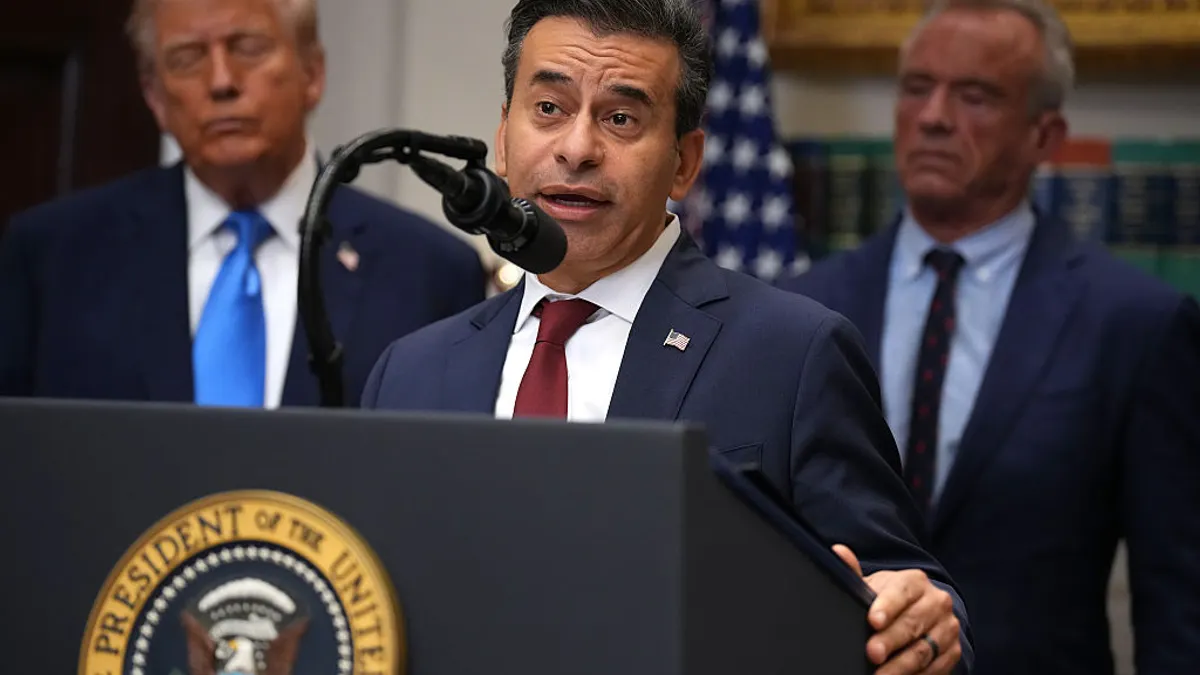A treatment that’s been on the market for over 100 years is facing new scrutiny from the FDA, prompting fears that supply of the drug could be in danger.
Since the 1890s, people with hypothyroidism have taken desiccated thyroid extract, an animal-derived version of thyroid hormone, to tackle the fatigue, depression and weight gain that can accompany the condition. Synthetic alternatives became available after 1956, which roughly 94% of the 24 million hypothyroidism patients today take. But the remaining 6% still opt for the animal-derived version, often citing better symptom relief than the alternative.
Controversy arose this year when FDA officials, noting a concerning rise in adverse events related to DTE, notified producers of the hormone that their products will now need to be approved by the FDA to ensure consistent safety and quality. More than 500 adverse events were reported between 1968 and early 2025, according to the regulator.
Because DTE predates the FDA, it didn’t receive the thorough regulatory process it would today. But the potential for tighter regulations around DTE sparked outrage among some pharmacists and influencers, including some aligned with the MAHA movement.
In addition to issues related to symptom management, some patients prefer DTE because they see it as a natural alternative. The American Thyroid Association, which issued a statement about the issue in September, noted that while it doesn’t recommend DTE as a first-line therapy, many patients don’t want to switch to the synthetic drug.
And although the FDA pointed to a spike in DTE adverse events in 2019 as evidence that it needs to be more tightly regulated, that rise may have been linked to the inconsistent doses more common in animal-derived products.
While the new moves could signal FDA willingness to stop the flow of unapproved DTE, the agency is also giving the industry months of wiggle room to adjust.
The future of DTE
The FDA anticipates it will delay DTE enforcement for roughly 12 months to give patients time to transition to synthetic options, such as Synthroid by AbbVie Pharmaceuticals, or the generic version of the drug, levothyroxine.
Meanwhile, companies in the DTE space — such as AbbVie, which manufactures a DTE product called Armour Thyroid — may have to make new moves to stay on the market.
“We understand that people living with thyroid conditions have trusted Armour Thyroid for decades, and we are dedicated to collaborating with regulators, healthcare providers, and patient communities to support continued access to this important medicine,” the company said in a written statement.
Acella Pharmaceuticals, one of the major DTE suppliers, is also working toward FDA approval for its biologic drug, said the company’s CEO Art Deas.
However, Deas said a 12-month enforcement window won’t give Acella enough runway to gain approval before unapproved products are banned. He’s hoping the FDA will preserve access to their drug while the company goes through the process.
FDA Commissioner Dr. Marty Makary suggested this might be the case in an August social media post. Makary wrote: “FDA is committed to pursuing the first-ever approval of desiccated thyroid extract, pending results of the ongoing clinical trials. In the meantime, we will ensure access for all Americans.”
Acella is on the verge of a phase 3 trial, and expects to dose the first patients in February of next year, Deas said.
“Long term, I want to get this product approved, because I believe it’s underutilized being an unapproved product,” he said. “There are always questions about unapproved products. Are they as safe as approved products?”
While he said the DTE manufacturing process is already rigorous, having the validation helps inspire confidence, something he believes could earn the company a greater share of the overall thyroid market.
For now, Deas said they’re hoping the FDA will release guidance allowing the company to keep supplying patients with DTE until the drug gains approval.
“It would give us some clarification and provide some comfort to the patients benefiting from it now that they will have it until it is approved,” he said.











